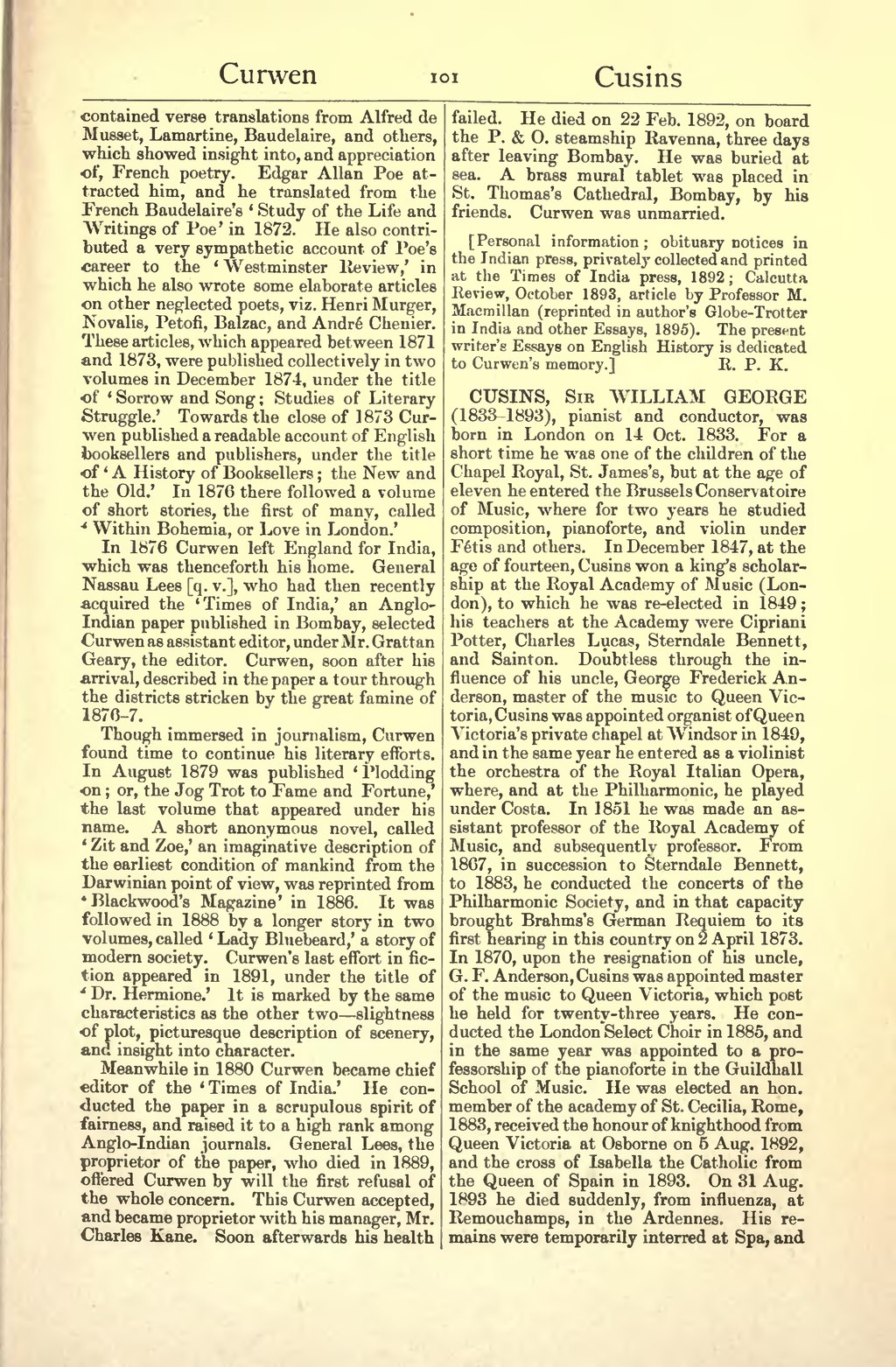contained verse translations from Alfred de Musset, Lamartine, Baudelaire, and others, which showed insight into, and appreciation of, French poetry. Edgar Allan Poe attracted him, and he translated from the French Baudelaire's 'Study of the Life and Writings of Poe' in 1872. He also contributed a very sympathetic account, of Poe's career to the 'Westminster Review,' in which he also wrote some elaborate articles on other neglected poets, viz. Henri Murger, Novalis, Petofi, Balzac, and André Chenier. These articles, which appeared between 1871 and 1873, were published collectively in two volumes in December 1874, under the title of 'Sorrow and Song; Studies of Literary Struggle.' Towards the close of 1873 Curwen published a readable account of English booksellers and publishers, under the title of 'A History of Booksellers; the New and the Old.' In 1876 there followed a volume of short stories, the first of many, called 'Within Bohemia, or Love in London.'
In 1876 Curwen left England for India, which was thenceforth his home. General Nassau Lees [q. v.], who had then recently acquired the 'Times of India,' an Anglo-Indian paper published in Bombay, selected Curwen as assistant editor, under Mr. Grattan Geary, the editor. Curwen, soon after his arrival, described in the paper a tour through the districts stricken by the great famine of 1876–7.
Though immersed in journalism, Curwen found time to continue his literary efforts. In August 1879 was published 'Plodding on; or, the Jog Trot to Fame and Fortune,' the last volume that appeared under his name. A short anonymous novel, called 'Zit and Zoe,' an imaginative description of the earliest condition of mankind from the Darwinian point of view, was reprinted from 'Blackwood's Magazine' in 1886. It was followed in 1888 by a longer story in two volumes, called 'Lady Bluebeard,' a story of modern society. Curwen's last effort in fiction appeared in 1891, under the title of 'Dr. Hermione.' It is marked by the same characteristics as the other two—slightness of plot, picturesque description of scenery, and insight into character.
Meanwhile in 1880 Curwen became chief editor of the 'Times of India.' He conducted the paper in a scrupulous spirit of fairness, and raised it to a high rank among Anglo-Indian journals. General Lees, the proprietor of the paper, who died in 1889, offered Curwen by will the first refusal of the whole concern. This Curwen accepted, and became proprietor with his manager, Mr. Charles Kane. Soon afterwards his health failed. He died on 22 Feb. 1892, on board the P. & O. steamship Ravenna, three days after leaving Bombay. He was buried at sea. A brass mural tablet was placed in St. Thomas's Cathedral, Bombay, by his friends. Curwen was unmarried.
[Personal information; obituary notices in the Indian press, privately collected and printed at the Times of India press, 1892; Calcutta Review, October 1893, article by Professor M. Macmillan (reprinted in author's Globe-Trotter in India and other Essays, 1895). The present writer's Essays on English History is dedicated to Curwen's memory.]
CUSINS, Sir WILLIAM GEORGE (1833–1893), pianist and conductor, was born in London on 14 Oct. 1833. For a short time he was one of the children of the Chapel Royal, St. James's, but at the age of eleven he entered the Brussels Conservatoire of Music, where for two years he studied composition, pianoforte, and violin under Fetis and others. In December 1847, at the age of fourteen, Cusins won a king's scholarship at the Royal Academy of Music (London), to which he was re-elected in 1849; his teachers at the Academy were Cipriani Potter, Charles Lucas, Sterndale Bennett, and Sainton. Doubtless through the influence of his uncle, George Frederick Anderson, master of the music to Queen Victoria, Cusins was appointed organist of Queen Victoria's private chapel at Windsor in 1849, and in the same year he entered as a violinist the orchestra of the Royal Italian Opera, where, and at the Philharmonic, he played under Costa. In 1851 he was made an assistant professor of the Royal Academy of Music, and subsequently professor. From 1867, in succession to Sterndale Bennett, to 1883, he conducted the concerts of the Philharmonic Society, and in that capacity brought Brahms's German Requiem to its first hearing in this country on 2 April 1873. In 1870, upon the resignation of his uncle, G. F. Anderson, Cusins was appointed master of the music to Queen Victoria, which post he held for twenty-three years. He conducted the London Select Choir in 1885, and in the same year was appointed to a professorship of the pianoforte in the Guildhall School of Music. He was elected an hon. member of the academy of St. Cecilia, Rome, 1883, received the honour of knighthood from Queen Victoria at Osborne on 5 Aug. 1892, and the cross of Isabella the Catholic from the Queen of Spain in 1893. On 31 Aug. 1893 he died suddenly, from influenza, at Remouchamps, in the Ardennes. His remains were temporarily interred at Spa, and
